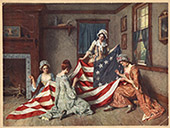Libraries, University of Nebraska-Lincoln
ORCID IDs
Document Type
Archival Material
Date of this Version
1690
Abstract
The Widdow Ranter, or, The History of Bacon in Virginia was probably written in 1688, first performed in late 1689, and published in 1690. It is a highly fictionalized drama of Bacon’s Rebellion of 1676 in Virginia, when Nathaniel Bacon (c.1640-1676), commander of a volunteer force of Indian fighters, succeeded for several months in overthrowing the government of Sir William Berkeley, who had declared Bacon a rebel and refused to countenance or commission his actions against the Indians. Mrs. Behn’s play casts Bacon as a classical hero, motivated by “Honour,” and in love with an Indian princess. A variety of supporting characters present a less-than-flattering picture of colonial life and mores. The title character, the young and wealthy widow Ranter, puts on men’s clothes and fights in several battles. The work ends tragically for Bacon, the Indian princess Semernia, and the Indian king Cavarnio; but comically and happily for everyone else. Its treatments of race, class, gender, rebellion, cross-dressing, sexuality, and miscegenation make it full of interest for a wide range of students of early America.
About the Author: Aphra Behn was born Eaffrey Johnson in 1640, daughter of Bartholomew Johnson and the former Elizabeth Denham, of Canterbury. In 1663–64, she spent a year with her mother and siblings in the new British colony of Surinam. Back in London, in 1664 she apparently married a German merchant, Johann Behn, although the union was cut short, whether by death or separation is not known. In 1666, she undertook a spy mission to Antwerp to recruit the dissident William Scot, then in service of the Dutch. By 1670, she had returned to London, and was writing plays for the Duke’s Company. In all, nineteen of her plays were performed, including several that featured roles for the actress Nell Gwyn, the mistress of Charles II. She also published poetry, novels, stories, and translations, and is held to be the first English woman to support herself by authorship. She died April 16, 1689, and is buried in Westminster Abbey.
An online electronic text (77 half-letter pages), based on the first edition of 1690. Includes notes, a note on the text, and an appendix containing John Dryden's original Prologue and Epilogue for the play.


